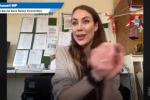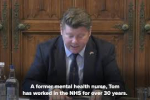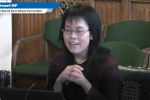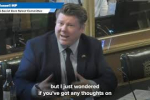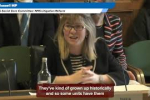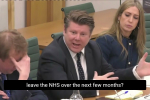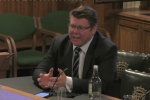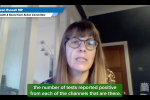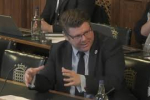The Health and Social Care Committee is made up of MPs from the main political parties.
Dean served on the Health & Social Care Select Committee from 2nd March 2020 to 20th September 2022.
It is the Committee's responsibility to scrutinise the work of the Department of Health and Social Care and its associated public bodies. It examines government policy, spending and administration on behalf of the electorate and the House of Commons.
Much of Dean's time on the Committee coincided with the COVID-19 pandemic.
The videos below are taken from Dean's time on the committee, and give the option to have subtitles on full screen if needed.
Health & Social Care Select Committee - The experiences of NHS and social care staff from the BAME community and actions that can be taken to support them - 12th January 2021
Health & Social Care Select Committee - Workforce Burnout - 12th January 2021
Health & Social Care Committee - Evidence session with the Health Secretary, Matt Hancock - 7th January 2021
Sir Patrick Vallance and Professor Chris Whitty questioned on Coronavirus: Lessons Learnt - 9th December 2020
Joint Inquiry examine Government Strategy for pandemic preparedness - 2nd December 2020
Joint Inquiry examine the impact of Covid-19 on health of ‘at-risk’ groups - 1st December 2020
Health & Social Care Committee - Workforce burnout and resilience in the NHS and social care - 17th November 2020
Health & Social Care Committee and Science & Technology Committee - 10th November 2020
Science & Technology Committee and Health & Social Care Committee - 4th November 2020
Health Select Committee - Safety of maternity services in England - 3rd November 2020
The first session of the Health and Social Care inquiry into workforce burnout and resilience in the NHS and social care aims to assess the scale and impact of staff burnout.
On the 13th October Dean Russell asked his questions to the Care Minister on helping Care Homes and the rise in insurance costs that they having been facing during COVID.
On 8th September Dean Russell was live on the Commons Health select committee, discussing social care reform with Secretary of State Matt Hancock.
On 21st July Dean was live on the Health & Social Care select committee where he was speaking with Chris Whitty, Dr Jenny Harries, Jeremy Farrar, Devi Sridhar, Prof Sir, John Bell, Prof Sir Paul Nurse and Prof Jonathan Van-Tam.
On 14th July Dean was live on the Health & Social Care select committee where they were exploring options for social care reform.
On 30th June Dean was live on the Health & Social Care select committee where they were hearing evidence from the CEO of the NHS, Sir Simon Stevens.
On Tuesday 16th June Dean was live on the Health & Social Care select committee evidence session on delivering Core NHS and Care Services during the Pandemic and Beyond.
On Tuesday 9th June Dean was live on the Health & Social Care Select Committee. This session was focused particularly on social care, funding and workforce. Which is something that is very important to Dean and so many others in Watford.
On Wednesday 3rd June Dean was live on the Health & Social Care Select Committee. This session was focused particularly on the new test and trace scheme in response to COVID19.
On Tuesday 19th May Dean was live on the Health & Social Care Select Committee. This session was on the management of the Coronavirus outbreak in care homes.
On Thursday 14th May Dean joins the discussion on Delivering Core NHS and Care Services during the Pandemic and Beyond. Dean asks a questions on the importance of looking after our Mental Health and the impact of COVID-19 on those from the BAME community.
On Tuesday 5th May Dean was back with the Health & Social Care Select Committee for an oral evidence session assessing the management of the Coronavirus outbreak. Dean asked questions to Sir Patrick Vallance (Chief Scientific Adviser) and Jenny Harries (Deputy Chief Medical Officer):
On Friday 1st May Dean spoke about the importance of the mental health of both NHS staff and their families. He used the example of Watford FC, which has set up a ‘Sanctuary’ within the stadium where Watford General staff can take some time away from the hospital:
On Friday 17th April Dean joined his fellow Health & Social Care Select Committee members to question the Secretary of State for Health & Social care Matt Hancock on the management of the COVID19 outbreak. You can watch Matt Hancock respond to Dean's two questions on PPE and oxygen levels:
On Tuesday 17th March Dean joined his fellow Health & Social Care Select Committee members to question Sir Patrick Vallance, the Government Chief Scientific Adviser. You can watch Dean asking questions on data and schools in relation to the COVID19 outbreak:
On Thursday 5th March Jeremy Hunt introduces the first hearing of the new Health and Social Care Select Committee and welcomes the new members of the committee. You can watch Professor Chris Whitty (Chief Medical Adviser) respond to Dean's questions on hospitals in relation to managing the COVID19 outbreak:
How do inquiries work?
The Committee holds inquiries into topics it wishes to investigate. Inquiry topics are chosen by the Committee and are based on a range of factors, including the work of Government and of other external organisations, and in response to key issues of the day.
When the Committee has chosen an inquiry it normally issues a press notice outlining the main themes of the inquiry. These are the inquiry’s “terms of reference”. The notice is published on the Committee’s website. In some cases, the Committee issues a public call for written evidence, inviting written submissions that address the terms of reference. Written submissions are welcomed from whoever has a relevant point to make. For more information on submitting written evidence please read the guidance.
Committees do not always issue a public call for written evidence. Sometimes the Committee may identify possible witnesses and invite them to submit evidence directly.
Once the written evidence has been assessed, the Committee will decide which witnesses to invite to provide oral evidence. This is when individuals answer the Committee’s questions and provide their opinion, usually during public sessions.
The duration of inquiries can vary. For example, sometimes an inquiry can last for several months with many oral evidence sessions, or an inquiry may involve a single oral evidence session.
Inquiries may conclude with the publication of a report containing the Committee’s findings and its conclusions, as well as recommendations to the Government and/or other public bodies. The Committee will then expect to receive a response from the Government to the recommendations, in principle within two months.
Alternatively, the Committee may wish to pursue the topics covered through the inquiry by writing to individuals, the Government or other organisations.
The Committee also holds pre-appointment hearings. This is an opportunity for the Committee to assess the suitability of the Government’s preferred candidate for certain posts, including the Chairs of NHS England and NHS Improvement, the National Data Guardian, and the Parliamentary and Health Service Ombudsman.



